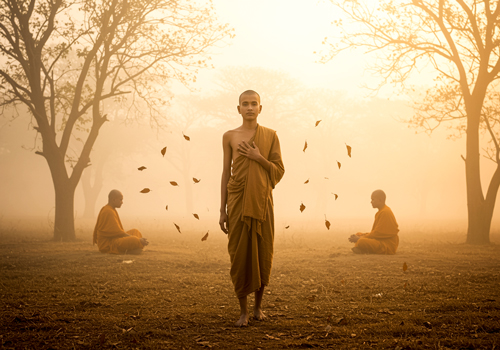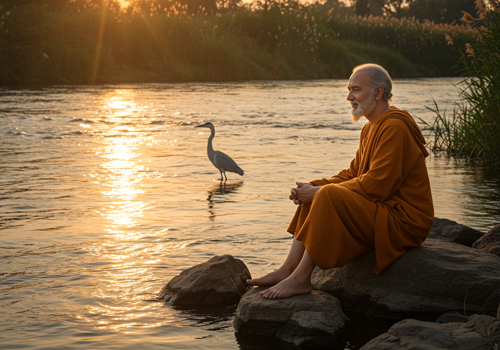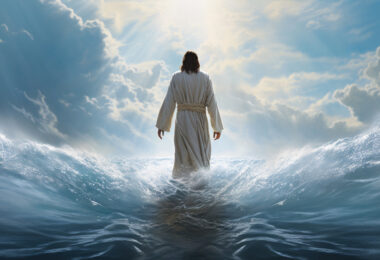Hermann Hesse’s Siddhartha is a deeply philosophical novel that traces the spiritual journey of a man named Siddhartha during the time of the Buddha. At the outset, Siddhartha is a young Brahmin, raised in a household of high status, immersed in religious rituals and teachings. From an early age, he exhibits intelligence, discipline, and a yearning for deeper understanding. However, he feels that the formal education and religious practices he has mastered are insufficient in providing him with the true meaning of life. Despite being admired by his peers and beloved by his parents, Siddhartha is not satisfied with secondhand wisdom and ritualistic piety. He decides that in order to find true enlightenment, he must abandon the comforts of home and pursue his own path. Joined by his close friend Govinda, he leaves his family and embarks on a quest to seek truth beyond the conventional teachings of the Brahmins.
The first significant stop in Siddhartha’s journey is with the Samanas, a group of wandering ascetics who renounce all worldly possessions and desires. Siddhartha embraces their severe practices with great determination. He fasts, meditates, and learns to detach himself from the physical world. He seeks to conquer the Self by denying it, believing that annihilating the ego and desires will bring him closer to spiritual liberation. Yet, after several years with the Samanas, Siddhartha becomes disillusioned. He realizes that while he can escape the body temporarily, he cannot truly rid himself of the Self through denial alone. The cycle of rebirth and suffering remains unbroken. The insights he gains are limited and do not lead to lasting transformation. This growing dissatisfaction pushes him to look elsewhere, especially after hearing about the great teacher Gautama—the Buddha—who is said to have attained enlightenment.

Siddhartha and Govinda set out to meet the Buddha, driven by the hope that his teachings might offer the answer they seek. When they find him, they are struck by his calm presence and spiritual radiance. Govinda is so moved that he decides to become one of the Buddha’s disciples, committing himself to the path of teaching and doctrine. Siddhartha, however, chooses a different route. Though he respects the Buddha deeply and recognizes his spiritual attainment, Siddhartha believes that true enlightenment cannot be taught. He fears that clinging to another’s teachings will only lead to intellectual understanding rather than personal experience. For Siddhartha, wisdom must be lived and discovered firsthand, not borrowed from another. With this conviction, he parts ways with Govinda and continues alone, determined to find enlightenment not through teachers or doctrines, but through his own path and direct encounters with life.
Leaving the world of asceticism and spiritual abstraction behind, Siddhartha enters a new phase of life—a world of the senses. For the first time, he allows himself to fully experience the pleasures and material aspects of human existence. He meets a beautiful courtesan named Kamala, who introduces him to the art of love and teaches him the subtleties of desire and attraction. To gain access to her world, Siddhartha begins working for a wealthy merchant named Kamaswami. He becomes successful in business, learns the art of negotiation, and accumulates wealth. Over time, he indulges in luxuries, gambling, and opulence. Siddhartha, once a seeker of transcendence, now immerses himself in worldly pleasures. For a while, he believes that this life may offer what he once sought. However, this phase, too, proves unsatisfying in the end. Despite his riches and pleasures, Siddhartha feels spiritually empty and increasingly disillusioned. He sees that his pursuit of desires has only led to boredom, weariness, and a sense of internal decay. The joy he sought has turned into a dull ache, and he is once again left with the realization that the path he is on is not the one to enlightenment.
In a state of despair, Siddhartha leaves the city and wanders into the forest, contemplating ending his life by a river. As he stands near the water, contemplating his fate, he hears the sacred syllable “Om,” which awakens in him a deep sense of unity and stillness. It reminds him of the eternal nature of life and the interconnectedness of all things. This moment marks a turning point. Rather than drowning himself, Siddhartha lies by the river and falls into a deep sleep. When he awakens, he feels renewed. It is as if he has been reborn. The river, with its flowing waters and endless continuity, becomes a powerful symbol for Siddhartha. It teaches him silently, showing that life is not linear but cyclical; it contains all things—joy and sorrow, birth and death, beginning and end—in one harmonious flow. The river becomes his teacher, and Siddhartha decides to stay near it and learn its lessons.
Siddhartha meets a humble ferryman named Vasudeva, who lives by the river and guides travelers across it. Vasudeva is serene, wise, and in tune with the rhythms of nature. Siddhartha recognizes in him a rare peace and chooses to live with him, working alongside him as a ferryman. Over time, he listens deeply to the river, just as Vasudeva does. The river speaks without words, and Siddhartha learns to hear its teachings. He observes that time is an illusion, that all moments are present in the now, and that life is a vast unity where all things are connected. Through quiet contemplation and the simplicity of life, Siddhartha begins to attain the wisdom he had long sought. He learns that suffering and joy are inseparable parts of existence, and that acceptance of life in its totality—rather than the rejection of it—is the key to peace.
Years pass, and Siddhartha continues to live in harmony with the river. One day, Kamala appears with her son, the product of her union with Siddhartha years earlier. She is on a pilgrimage to visit the Buddha but collapses from illness and dies by the river. Siddhartha takes in the boy, whose name is also Siddhartha, and tries to raise him. However, the boy is rebellious, spoiled by a life of wealth, and resents the simple, ascetic life his father now leads. Siddhartha is deeply attached to his son and struggles with letting him go, believing that he can guide him to a better life. Yet, in trying to impose his will, Siddhartha experiences the pain of love and attachment. He begins to realize that just as he had to follow his own path, so too must his son. Wisdom cannot be forced upon another; it must arise from one’s own experience. Eventually, the boy runs away, and Siddhartha is heartbroken, but through this pain, he gains a deeper understanding of compassion and human suffering.
This experience deepens Siddhartha’s insight into the nature of love and the interconnectedness of all beings. He sees that his own journey mirrors the universal path of suffering, longing, and the search for meaning. In his acceptance of loss, he moves beyond selfish attachment and reaches a place of inner peace. Siddhartha realizes that true wisdom is not in denying the world or escaping it, but in embracing it fully. He comes to understand that the world is not an illusion to be rejected, but a manifestation of the divine. Every aspect of life—every joy, every sorrow, every moment—is sacred. The river has taught him that all things are one, that separateness is an illusion, and that the essence of life is unity and love. He has come to a place where he no longer seeks, but simply is.
Eventually, Govinda, still a follower of the Buddha and now an old monk, hears of the wise ferryman and visits Siddhartha. The two friends reunite, and Govinda does not immediately recognize Siddhartha. As they talk, Govinda expresses his continued yearning for enlightenment. Siddhartha does not give him a doctrine or teaching, but rather speaks from his own experience. He explains that wisdom cannot be taught; it must be lived. He shares his realization that all things—saints and sinners, birth and death, joy and suffering—are part of the same oneness. When Govinda asks for a final word or teaching, Siddhartha does not offer a theory but invites him to see for himself. In a final act of communion, Siddhartha asks Govinda to kiss his forehead. In that moment, Govinda is overwhelmed by a vision of the unity of all life. He sees the eternal flow of existence, the faces of all beings, the interconnectedness of everything. It is a moment of profound revelation, and he experiences the peace that had long eluded him.
Through Siddhartha’s journey, Hesse illustrates the futility of seeking truth solely through doctrine or asceticism. The novel suggests that enlightenment is not a fixed state but a dynamic and living realization of the oneness of all life. Siddhartha’s path is not linear but cyclical, filled with trials, errors, awakenings, and profound personal experiences. His journey shows that spiritual wisdom cannot be imposed from outside—it must come from direct, lived experience. Through the river, the ferryman, the child, the pleasures of the senses, and the pain of love, Siddhartha learns that truth is not found in escaping the world, but in embracing it completely. The journey toward enlightenment involves not rejecting the world but seeing the divine within it.
Hesse’s Siddhartha is a meditation on the individual’s search for truth, the limitations of organized religion, and the profound beauty of experiential knowledge. Siddhartha moves from the rigidity of formal religion to the extremes of self-denial, from indulgent materialism to humble simplicity. Each phase is essential to his growth. Rather than offering a prescriptive path, the novel invites the reader to recognize the sacredness of the ordinary, the wisdom of listening, and the necessity of personal discovery. It affirms that the journey is as important as the destination, and that true understanding arises not through words, but through silence, observation, and love. Siddhartha’s final peace is not an escape from life, but a full embrace of it—a realization that everything is one, and that all is as it should be.

Sample Chapter from the Original Book:
Chapter 1: The Son of the Brahmin
Siddhartha, the handsome son of the Brahmin, the young falcon, grew up together with his friend Govinda, the Brahmin’s son, in the shadow of the house, in the sun of the riverbank near the boats, in the shadow of the sala forest, and in the shadow of the fig trees. The sun tanned his fair shoulders on the riverbank while he bathed, during the holy cleansing, at the holy sacrifices. Shadows flowed into his black eyes in the mango grove, during the boyish games, when his mother sang, at the holy sacrifices, during the teaching of his father the scholar, and when speaking with the wise ones. For a long time Siddhartha had taken part in the wise ones’ discussions; he had practiced word-wrestling with Govinda, had practiced the art of contemplation and the duty of meditation with Govinda. He already understood how to speak the “Om” silently, that word of words, how to speak it silently in his inner being as he inhaled, how to pronounce it silently out of himself as he exhaled, how to do so with his whole soul while his forehead was enveloped by the radiance of the clear-thinking mind. He already understood how to recognize Atman within this inner essence of his that was indestructible and one with the universe.
Joy sprang up in his father’s heart over the son who was so apt to learn and so thirsty after knowledge; he saw growing within him a great sage and priest, a prince among the Brahmins.
Delight welled up in his mother’s heart when she saw him taking long strides, saw him sitting down and standing up: Siddhartha the strong and handsome, who strode upon lean legs and who greeted her with impeccable manners.
All the young daughters of the Brahmins felt love stirring within their hearts when Siddhartha walked through the side-streets of the city with a beaming face, a lean physique, and a royal look in his eyes.
Govinda the Brahmin’s son, however, loved him more than all of these. He loved the eye of Siddhartha and his sweet voice, his gait and the perfection of his movements; he loved everything that Siddhartha did and said, and above all he loved Siddhartha’s mind, his sublime and fiery thoughts, his blazing will, and Siddhartha’s high calling. Govinda knew that this would be no ordinary Brahmin, no lazy official presiding over the sacrifices, no money-grubbing merchant hawking magic trinkets, no vain and vacuous speaker, no wicked and lying priest, and also not a good-hearted but dim-witted sheep in the plebeian herds. Govinda didn’t want to be such a person either, didn’t want to be a Brahmin like all the ten thousand other Brahmins. He wanted to follow Siddhartha, who was beloved and majestic. When Siddhartha first became a god, when he entered into the radiance, then Govinda wanted to follow him as his friend, his escort, his servant, his spear-carrier, and his shadow.
In this manner, everyone loved Siddhartha. He brought everyone joy; he pleased everyone.
However, Siddhartha didn’t bring himself joy; he didn’t please himself. He strolled on the rosy paths of the fig gardens, sat in the blue shadows of the grove of meditation, washed his limbs daily in baths of atonement, and sacrificed in the deep shadows of the mango forest. Everyone loved him; he was joyous to them, and yet he carried no joy in his own heart. Dreams and restless thoughts came flowing to him out of the river’s water, twinkled to him from the stars of the night, melted out of the sunbeams. Dreams and anxiety came billowing out of the sacrificial smoke, whispering from the verses of the Rig-Veda or trickling out of the old Brahmin’s teachings.
Siddhartha had started to cultivate the seed of discontent within himself. He had started to feel like his father’s love, his mother’s love, and the love of his friend Govinda wouldn’t make him happy forever, wouldn’t bring him peace, satisfy him, and be sufficient for all time. He had started to suspect that his illustrious father, his other teachers, and the wise Brahmins had shared the majority and the best of their wisdom with him, that they had already poured their all into his ready vessel without filling the vessel: the mind wasn’t satisfied, the soul wasn’t quiet, the heart wasn’t stilled. The purifications were nice, but they were just water, and didn’t wash away sins; they didn’t cure the mental thirst or allay his heart’s anxiety. Sacrifices and invocations to the gods were superb—but were they sufficient? Did the sacrifices bring happiness? And what about all those gods? Was Prajapati really the one who had created the world? Wasn’t it Atman, he who was the Only One, the All-One? Weren’t the gods creatures, created just like you and I were: subject to time and transitory? Was it even good, was it right, did it make sense or was it important to sacrifice, to the gods? To whom else would one sacrifice to whom else should one bring worship other than Him, the Only, the Atman? And where could Atman be found, where did he live, where did his eternal heart beat—where else other than in the self, in one’s inner being, in the indestructible part of each person that they carried within themselves? But where was this self, where was this inner being, this most paramount thing? It was not made of flesh or the legs that carried it, it wasn’t just the thoughts or the awareness—or so taught the wisest men. Where then was it? One had to penetrate that far into the self, into myself, into the Atman—was there some other way, however, a search which still yielded worthwhile results? Ah, but nobody pointed to this way, nobody knew it: not father, not the teachers and wise ones, not the holy chants sung during sacrifices! They knew everything, those Brahmins and their holy books. They knew everything, they had concerned themselves with everything and with more than everything: the creation of the world, the origins of language, of foods, of inhalation and exhalation, the institution of the senses, the deeds of the gods—they knew an inordinate amount, and yet was it worthwhile to know everything like this when one didn’t know the one and only thing that was most important—that which alone was important?
To be sure, many verses from the holy books—especially the Upanishads of the Sama-Veda—spoke about these innermost and most important things—majestic verses. “Your soul is the whole world” was written there; it was also written that the person who slept in the deepest slumber went within to their innermost place and lived in Atman. Wonderful wisdom stood within these verses, all the wisdom of the wisest was gathered there in the magical words, pure like the honey gathered by the bees. No, the behemoth of knowledge that innumerable generations of wise Brahmins had gathered and protected there wasn’t to be lightly esteemed. But where were the Brahmins, where were the priests, the wise ones and the penitents—those who were successful not only in knowing this deepest wisdom but also in living it? Where were the elders who could merge this Atman of their dreams with the waking being, to bring it fully into their lives and into their words and deeds? Siddhartha knew many venerable Brahmins—not the least of whom was his father, who was pure, scholarly, and highly esteemed. His father was admirable: his habits were quiet and elegant, his life pure, his words wise, and the thoughts that inhabited his brow were both fine and noble—but did he who possessed so much wisdom live a blessed life? Did he have joy; wasn’t he also a mere seeker, one who had thirst? Did not he, who had thirst, have to receive a holy quenching of this thirst by drinking time and time again at the sacrifices, at the books, at the conversations of the Brahmins? Why did he, who was irreproachable, have to wash out his sins every day, have to expend great effort once more to attain purification each and every day? Wasn’t Atman him; didn’t the ancient spring flow in his heart? The ancient spring must be found in one’s own self; one must own it! Everything else was just a search, a detour; it was to go astray.
Thus went Siddhartha’s thoughts; this was his thirst, his sorrow.
He often spoke to himself out of the Chandogya-Upanishad: “Verily, the name of the Brahman is Satyam—in truth, one who knows this enters daily into the heavenly world.” This heavenly world often appeared close, but he had never totally reached it; never had he quenched the ultimate thirst. Furthermore, among all the wise ones whom he knew whose teaching he had savored—even the wisest—among them all there were none who had totally reached the heavenly world, who had completely quenched the eternal thirst.
“Govinda,” said Siddhartha to his friend, “Govinda, beloved, come with me among the Banyan trees, and we will practice meditating.”
They went to the Banyan trees and sat down: here Siddhartha, and Govinda twenty paces farther. When Siddhartha sat down, ready to speak the Om, he murmured and repeated the verse:
“Om is the bow; the arrow is the soul,
The Brahman is the arrow’s goal
That one should continuously hit.”
When the usual time for practising meditation had passed, Govinda rose up. The twilight had come and it was time to perform the cleansing of the evening hour. He called Siddhartha’s name. Siddhartha gave no answer. Siddhartha sat with his eyes open, immersed, staring with his eyes fixed upon a very far goal; the tip of his tongue stuck out a little between his teeth and he didn’t appear to be breathing. Thus he sat, shrouded in meditation, thinking Om, his soul sent out like an arrow after the Brahman.
Once, the Samanas pulled through Siddhartha’s town. They were pilgrims and ascetics: three scraggly, worn-out men who were neither old nor young, with dusty and bloody shoulders. They were nearly naked, singed by the sun, given over to loneliness, strangers and enemies of the world, and estranged, gaunt jackals in the domain of mankind. From behind them wafted a hot scent of quiet passion, of a duty that destroys, of a merciless self-effacing.
In the evening, after the hour of contemplation, Siddhartha said to Govinda: “Early tomorrow, my friend, Siddhartha will go to the Samanas. He will become a Samana.”
Govinda paled when he heard these words and saw the resolution in the stony face of his friend, a resolution that, like the swiftest arrow let loose from the bow, could never be deflected. As soon as Govinda glimpsed this, he recognized: now it begins; now Siddhartha goes his own way; now his fate begins to sprout, and with his, mine. Govinda paled like the peel of a dry banana.
“O Siddhartha,” he called, “will your father allow you to do that?”
Siddhartha glanced at his friend like one just waking up. As quickly as the arrow flies, he read Govinda’s soul; he read the anxiety and the devotion there.
“O Govinda,” he said quietly, “don’t waste any words on this. Tomorrow at daybreak I will begin a Samana’s life. Don’t discuss this any more.”
Siddhartha stepped in the chamber where his father sat on a raffia mat, and walked behind his father, standing there until his father sensed that someone was standing behind him. The Brahmin spoke: “Is that you, Siddhartha? Well, say what you have come here to say.”
Siddhartha spoke: “With your permission, my father, I have come to say to you that I am desirous of leaving your house tomorrow and going to the ascetics. My wish is to become a Samana. May my father not be opposed to this.”
The Brahmin was silent, and silent so long that in the little window the stars wandered and changed their configuration before the silence in the chamber found an end. Silent and still, the son stood with crossed arms; silent and still, the father sat on the mat, and the stars moved in the heavens. Then the father spoke: “It is not fitting for the Brahmins to speak with severe and scornful words. Yet, I see displeasure moving your heart. I would not like to hear this request come out of your mouth a second time.”






